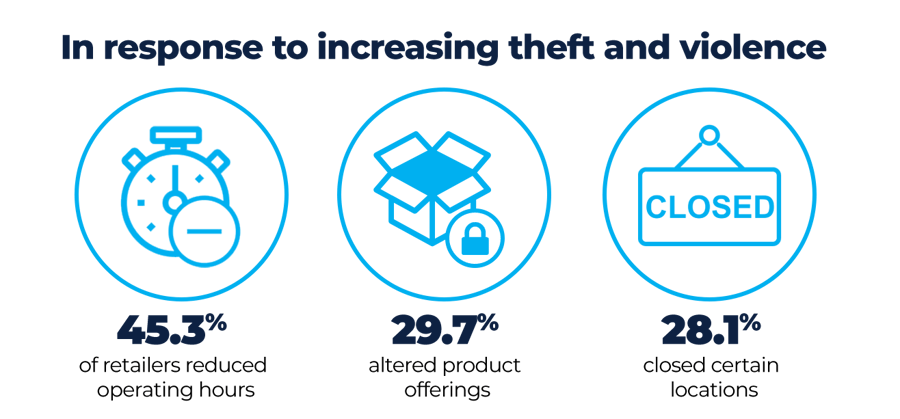The National Retail Federation has published its 2023 survey results. Their comprehensive survey includes insights from 177 retailers which account for $1.6 trillion in retail sales. While unsurprising, it was interesting to discover new risks and threats on the radar screens of retailers. Violence during a criminal act and homelessness concerns didn’t register as a priority in 2022 but were in the top 3 risks faced by retailers (just behind organized retail crime) this year.
This is a theme in other sectors too. National Institute of Health data substantiates the trend. Its studies indicated that the rate of violent crime is 40 times higher and the rate of nonviolent crimes 27 times higher among the homeless population because this group of people is often suffering from a mental illness or addiction. The overall rate of criminal offense is 35 times higher in the homeless mentally ill population than in the housed mentally ill population.
This heightened aggressiveness that retailers are experiencing with unhoused people usually manifests as people making aggressive demands for money and acting in myriad erratic ways. It’s impossible to know if their threats are valid, but expecting store staff to respond to such threats is undoubtedly well beyond the call of duty. All they can do is dial 911 for reinforcement, but with law enforcement agencies and officers often spread very thin, the response isn’t always as timely as retailers and their customers would like.
This is a serious problem and to say the solutions to our nation’s mental health crisis are complex would be an immense understatement. What we do know is that concentrated numbers of homeless people can destroy retail businesses, driving out thriving businesses and future opportunities for economic development and employment.
Fortunately, law enforcement agencies are increasingly training officers to intervene in these situations. In over 2,700 communities nationwide, crisis intervention training programs are in place, equipping law enforcement to respond to situations where mental health issues are a catalyst for disturbing the peace and affecting criminal behavior. This training equips officers with resources not only to intervene but to help connect individuals with mental healthcare providers.

Retail response
In response to increasing theft and violence, retailers have had to reduce operating hours, alter product offerings or even close certain locations. Rather than take drastic measures that will negatively impact the bottom line or be forced to wait for a response from police reinforcements, retailers might consider engaging the support of off-duty officers to stand guard at the most negatively impacted stores or at certain hours of the day.
One international telecommunications provider engaged the help of off-duty officers as it struggled with shrinkage and theft. Summit delivered a security strategy to deter criminals at 30 high-risk locations. These stores were losing, on average, $25,000 per month, a cumulative loss of revenue in excess of $750,000 monthly. By targeting these specifically, it cut losses to $180,000 and realized a 376% return on its investment in off-duty officers.
Proactively addressing crime keeps employees and customers safe and confidently working and shopping at the location. When citizens feel safe and businesses are protected, people invest in those businesses and the whole community benefits.
Summit Off-Duty Services helps connect businesses with off-duty police officer protection. Our experienced team can help you design the right security protocols and line up officers from our vast, nationwide network of 60,000 officers.
